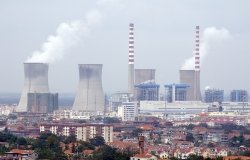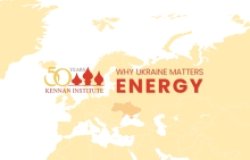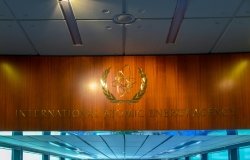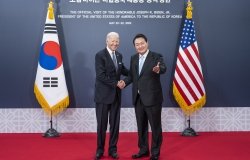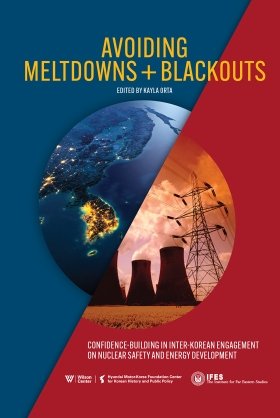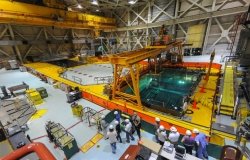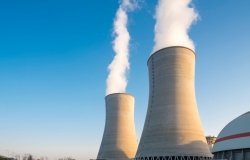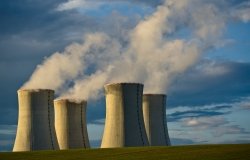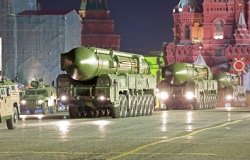France and India’s Strategic Partnership in a Contested World

Flickr / Ghislain Mariette / Présidence de la République
Indian Prime Minister Narendra Modi's attendance at this year’s Bastille Day celebrations in Paris was an important show of support for the critical relationship between his country and France. Modi and French President Emmanuel Macron met and discussed a wide range of topics of shared interest including defense, space, and energy cooperation. The visit coincided with the 25th anniversary of President Jacques Chirac’s 1998 trip to India, when he and then-Prime Minister Atal Bihari Vajpayee elevated the bilateral relationship to a strategic partnership, the first for India and a sign of burgeoning bilateral ties in what would become an increasingly contested multipolar world.
France and India’s strategic partnership has seemingly endless potential. Both have similar views on energy and security, and both possess the economic, political, and geopolitical clout to effect real change. The marriage of France’s traditional power, sprawling diplomatic alliances, and entrenched position in the international order with India’s rising-power status, growing economy, and a willingness to challenge global norms and traditions to reshape geopolitics makes the pair formidable. France supports reforming the UN Security Council (UNSC), in part by making India a permanent member, an overdue update to align the body with the current international balance of power. France also realizes the influence of the recently expanded BRICS, whose membership includes India and other countries that collectively constitute 37% of global GDP and 46% of the global population. At the last BRICS summit, Macron requested attendance as an observer, but Russia, another member, balked. France sees its partnership with India as an important component of engagement with rising powers and a demonstration of Paris’ ability to offer the Indo-Pacific an alternative to China.
Macron has consistently referred to this alternative as a “third way”, which irks some of France’s traditional allies, especially the United States. But it strikes a chord with countries such as India that are keen to reshape the world order to better reflect shifting power dynamics. Macron attended September’s G20 summit in India before visiting Bangladesh, travels designed to advance France’s global aspirations by recommitting the country to a role in the Indo-Pacific and shoring up the necessary support for that from key regional allies. Franco-Indian relations have long been strong—they currently include a roadmap to 2047—and will remain so as the links between the countries serve a range of mutual strategic interests.
Partners in Autonomy
While France continues to stand on its soapbox in Europe discussing strategic autonomy, a term that is becoming more political yet lacking broad appeal on the continent, the country finds a receptive audience in India with its similar views on security and defense. Both countries seek to maintain credible, homegrown defense capabilities—which has led both to become nuclear powers—and fiercely defend their independent strategic direction. This does not negate working closely with allies, such as the United States or Europe, but it does give rise to a tendency to question norms.
This shared vision for strategic autonomy has also led France and India to ramp up their efforts towards greater defense industrial cooperation. At the G20 summit, Macron and Modi called for a plan to be finalized. They recognize it as a key component in ongoing partnerships in the design, development, testing and manufacturing of advanced defense technologies and platforms. France is also helping India expand domestic arms production, and India plans to establish a “technical” office in its Paris embassy to help streamline further defense deals.
Over the past decade, France has become India’s largest arms supplier after Russia. New Delhi may encounter challenges in obtaining arms from Russia due to sanctions and the ongoing war in Ukraine. These impediments are likely to encourage increased arms trade between India and France. Between 2017 and 2021, India was France’s top buyer of arms, purchasing 29% of exports. The surge in India’s imports from France is bolstering Paris’ standing in the global arms market, with France now competitively challenging Russia for the title of the second-largest arms exporter, trailing only the United States.
France and India also cooperate on future security challenges, namely those in space. Cooperation in this area has been another long-term effort. As early as 2011, the two countries launched Megha Tropiques, a joint satellite mission to study the tropical climate and better understand climate change. In 2018, France and India released their Joint Vision for Space Cooperation to promote deeper collaboration between their national space agencies. Last June, the countries held an inaugural Strategic Space Dialogue in Paris, bringing together experts to discuss the security challenges and opportunities beyond Earth. In August, India made history as it became the first country in the world to land a spacecraft near the moon’s south pole. Following this historic event, Modi invited French astronaut Thomas Pesquet to be guest of honor at the French Space Days event in India, another expert gathering held in October of this year. With its first manned space mission planned for 2025, India will need more technical consultations with allies. And even beyond that timeframe, space–given its overlap with two primary strategic concerns, security and climate change–will continue to be a priority for the Franco-Indian strategic partnership.
Enhancing Nuclear Energy Partnership
France and India have also been working together on energy issues. The countries strive to reach carbon neutrality as soon as possible but no later than 2050 and 2070, respectively. India is party to the Paris Agreement and, Modi claims, was one of the first G20 countries to fulfill its obligations under the pact and is working with France on the global challenges of climate change. The two are strong proponents of nuclear energy as a sustainable alternative to fossil fuels, and both see solar energy and hydropower as areas of cooperation and growth. French company Engie has invested heavily in renewable energy projects in India, mostly solar. France is also sharing information on enhancing India’s electrical grid, to meet India’s urban center’s demands, and to lay the groundwork for future joint energy projects.
Following their summer meeting, Macron and Modi announced enhanced cooperation on a nuclear power plant in Jaitapur in western India. The collaboration, which began in 2018, will include a partnership on small and advanced modular reactors, staff training and the promotion of careers in the nuclear energy sector through internships and exchanges. The Jaitapur plant is slated to be the world’s most powerful, capable of meeting the energy needs of 70 million Indian households. Although nuclear energy is an area of growth for India, a strong opposition exists and may limit the further expansion of nuclear energy capabilities.
Elsewhere, India is one of only two non-European partners invited to cooperate on the Jules Horowitz Research Reactor (JHR) under construction at Cadarache in southern France. The reactor is scheduled to begin operations between 2026 and 2028. It will also be the premier site for materials testing and serve as an incubator for the next generation of reactor designs. An international consortium of European partners, including the European Commission and utility companies, plus the Indian and Japanese governments have been invited to join.
India’s energy needs are expected to more than double by 2050, according to BP’s Energy Outlook, and the country’s electricity generation by 2050 will be four to five times 2019 levels. This gives France a highly scalable partner in the energy sector, while India benefits from access to French nuclear expertise and, more broadly, European expertise on renewables. Both countries will use the collaboration to help meet two shared strategic goals, bolstering energy independence and combating climate change.
Horizon 2047
Emerging digital technologies, the climate crisis, heightened competition in the Indo-Pacific, and the countries’ global roles will define the next phase of France and India’s partnership roadmap to 2047—the 100th anniversary of India’s independence and the 50th anniversary of diplomatic relations with France. How are the countries preparing to meet these shared challenges?
France and India are deepening their cooperation in the area of digital technology, as declared in the 2019 Indo-French Roadmap on Cybersecurity and Digital Technology. Under the plan, the two countries have drafted legal and regulatory frameworks and established best practices for cybersecurity. They are also focused on research and development and bolstering investment in technologies, such as artificial intelligence, via domestic startups. Within a year of the cyber roadmap’s signing, La French Tech—a government initiative to support homegrown startups—opened an office in Bengaluru, India to link young companies in both countries. France’s aim to be Europe’s startup hub will benefit from cooperation with India, which boasts the world’s third biggest startup ecosystem. Collaboration was most recently solidified in October, when Paris and New Delhi concluded a memorandum of understanding to further institutionalize joint work on digital technologies.
The Indo-Pacific has, and will continue, to be a focal point of technological and, consequently, strategic competition. France, an Indo-Pacific power in principle, owing to its 1.6 million citizens living in overseas departments, has made clear its intention to maintain that role. At the same time, India is balancing a tense, outright hostile relationship with its giant neighbor, China. Although India is pro-actively pushing back against a growing Chinese naval presence, France’s active presence in the Indo-Pacific further stymies China’s claims over the region. As long as this remains the state of regional affairs, partnerships between France and India will serve both countries’ strategic interests .
Beyond the Roadmap
The impact of France and India’s partnership transcends the comprehensive roadmaps and memoranda of understanding agreed upon. The two countries have established strong relationships in many areas of shared interest, from defense to nuclear energy to a shared vision for the future of the world order. These relationships also have geopolitical benefits. They support France’s efforts to offer itself as a “third way” for Indo-Pacific nations caught between the United States and China. They also position India to be a bridge between France and rising global powers, especially others in the BRICS. This strategic partnership does not exist in a vacuum, how France and India navigate other major powers–namely the United States and China–will determine their ability to alter the current international order and better exercise their shared definitions of strategic autonomy.
Beyond roadmaps and joint statements, France and India’s Strategic Partnership is one to watch over the coming decades. It will serve as a bellwether of cooperation and contention between the traditional powers that shaped much of the last century and the rising powers that are shaping the current one. In an increasingly contested world, strong and enduring partnerships, such as France and India’s, will be vital to face shared challenges with profound impact for the wider world.
This article is also available via the Bertelsmann Foundation.
About the Authors

Global Europe Program
The Global Europe Program is focused on Europe’s capabilities, and how it engages on critical global issues. We investigate European approaches to critical global issues. We examine Europe’s relations with Russia and Eurasia, China and the Indo-Pacific, the Middle East and Africa. Our initiatives include “Ukraine in Europe” – an examination of what it will take to make Ukraine’s European future a reality. But we also examine the role of NATO, the European Union and the OSCE, Europe’s energy security, transatlantic trade disputes, and challenges to democracy. The Global Europe Program’s staff, scholars-in-residence, and Global Fellows participate in seminars, policy study groups, and international conferences to provide analytical recommendations to policy makers and the media. Read more

Wahba Institute for Strategic Competition
The Wahba Institute for Strategic Competition works to shape conversations and inspire meaningful action to strengthen technology, trade, infrastructure, and energy as part of American economic and global leadership that benefits the nation and the world. Read more




